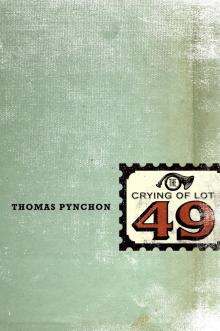- Home
- Thomas Pynchon
Mason & Dixon Page 10
Mason & Dixon Read online
Page 10
“I believe in Vibrations,” declares Mason, “— I believe, that Vibrations from that horrid family get into their food, which is difficult enough to enjoy to begin with,— ”
“And?”
“I’d rather be out here.”
“Why aye,”— as far projected into the Sea, each will confide, as Land may go, out blessedly alone upon the furthest Point, nothing beyond but the uninterrupted planetary Seas of the 40’s, the West Wind Express, and the Regions of Ice, and the Mystery at the exact Other Pole,— the night Fog creeping like quicksilver, all but surrounded by a Waste where the Seas might grow higher than either Astronomer can imagine without Fear, set up and waiting for a Southern Star, Lumina of a shapely Constellation unnam’d, forever below any British Horizon, to culminate.
They have come upon a Queue forming up a dark street, and decide to join it, Dixon in his red coat, boots with three-inch heels, and mysteriously cockaded hat, Mason, after an hour before his traveler’s Mirror, having assum’d rather a darken’d, volish neutrality. As they move slowly toward the makeshift kitchen-tent, more and more of its candle-lit interior may be seen. A man in a Sarong cooks as though possessed, running about with a Krees to gaze too long at whose bright wavy edge might put a Man’s Thumbs a-prickle, as his Mind in a Bind,— poking embers precisely into huge gusts of flame, stirring the contents of various pots, peeling Garlick, deveining and Butterflying shrimps, slicing vegetables, boning and filleting fish, performing perhaps a dozen such Tasks more or less simultaneously with this single Implement, whilst beds of embers glow, and from iron pans rise huge clouds of smoke and steam, so fragrant that breathing them is like eating the first Plate-ful of a large Meal,— and his wife hands the food out the window and collects the money, and older children carry and prepare whilst younger ones tend the babies in the dark, watching the Progress of the Krees, which they have seen fly, heard sing, and, in the presence of a pure well, felt a-tremble, there being an odd number of waves to its Blade, signifying Alliance with the correct Forces.
“Amazing,” Mason somehow having fallen into conversation with one of the Children. “In my country, near my Home, since the Mills came, our pure Wells have been well hidden, and we must now ask Dowsers, who use long Hazel Wands in much the same way, to find them.”
“Have the Dutch conquer’d your land, too?”
“Oh, dear me, no,—” Mason prim’d to chuckle in condescension till Dixon, infernally a-beam, says, “William of Orange, what about him? Tha wouldn’t style thah’ a Conquest?”
“Captain Jere, Good Evening, the Satay Deluxe as usual?”
“Looks bonnie, Rakhman,— what are those yellow bits there?”
“Mangoes. Still on the green side tonight, but tomorrow,— tomorrow’s the Day.”
Accordingly, next morning at the first risen Gull’s cry, “Eeh, Mason,— the Mangoes are in!”
“Bring me back a likely one,” Mason mutters, “and perhaps I shan’t kill you.” Yet out of something like Duty ow’d his Senses, he finds himelf shambling down to the Market, yawning in the sun, there to behold Mountains of the Fruit apparently all come to Ripeness at the same Moment,— causing a Panic, for all must then be pick’d in a short time from the Groves up-country and rush’d directly to Town, to lie in these towering Heaps, waiting to be lifted and apprais’d, as they find the Reverend Wicks Cherrycoke doing when they arrive.
“Well met, Gentlemen! What a Morning! One feels as Adam felt,— even better, as Eve.”
“I shall kill him now,” Mason declares.
“Eeh, get the old Nozzle down upon this one, Mason,— a Beauty, ’s it not?” The Aroma captures Mason’s Attention. “Aye, tha’d better eat thah’ one now thy Nose has been all over it.”
“Why don’t I throw it at you instead?” They are soon retir’d to a nearby Stoep, where they sit eating Mangoes. Neighboring Stoeps are similarly occupied.
“Thought you’d sail’d,” Dixon says.
“The Seahorse proceeds without me. East of the Cape, Captain Grant was pleas’d to inform me, men of Christ are not desir’d,— tho’ why, he refus’d to say, even when I suggested that if clergy be bann’d, then what is contemplated out there must be too terrible to speak of, in any way but secretly.”
“I, personally, am looking for that B-st-rd St.-Foux,” Captain Grant declar’d. “My Seahorse is a damn’d snappy little Package, and I suppose I’ve grown to love her, for her Honor is become important to me.”
“Shall I be safer in Cape Town?” inquir’d the Revd.
“Safe enough. You shouldn’t have long to wait. Indiamen come thro’ all the time, tho’ they are most inflexibly anti-clerickal Folk,— their Cargo spaces are purposely built a Tun short to avoid the law that requires a Chaplain on board,— so you’d do better to represent yourself in some other line of work.”
“Tha could pretend to be an Astronomer,” Dixon says, “— all tha need to know, I can teach thee in five minutes.”
“Surveying won’t even take that long,” snaps Mason. “Piss runneth downhill, and Pay-Day is Saturday,— now you’re a qualified Fence-runner.”
The Revd holds aloft a Mango, as if ’twere a Host. “Had I gone, I should have miss’d this. Regard how the fruit takes its shape and feel from this great seed-case within, which the Spanish call el Hueso, ‘the Bone.’ This Mango handles like flesh,— to peel it is to flay it,— to bite into it is to eat uncook’d Flesh,— though I can imagine as well uncomfortable religious questions arising.”
Mason, who has been shock’d by impieties far more venial, might have shar’d his Moral Displeasure were the Topick not Food, allowing him promptly to advert to his own Iliad of dietary Misfortune here among the Dutch. “Their emphasis upon roots,— the eternal boiling,— the absence of even salt, we have already review’d. ’Tis the Sheep,— Heaven forfend we should ever find a Moment without Sheep in it. Sheep, where I come from, are more important than all but a few humans. A boy is as likely to learn to skate upon a Shearing-floor as upon the Ice. The smell, at some times of year sensible for Miles, of Sheep, and wool-fat, and that queasy Nidor of Lambs baking in ovens meant for bread . . . the very nasal Patina that met me here, upon entering my first Dutch house, of Mutton-fat vaporiz’d and recondens’d, again and again, working its way insidiously, over the years of cooking, into all walls, furniture, draperies, within a certain radius of that kitchen,— ahrrhh! How foolishly did I believe I’d escap’d these perfumes of Gloucestershire,— nay,— at the Dutchman’s Table, I am return’d to them, as to a kind of Hell.”
The young clergyman nods in apparent sympathy. “Then eating Malay food seems a cheap enough Deliverance,— bearing in mind that the cuisine of a people whose recreations include running Amok is necessarily magickal in purpose and effect, and no one is altogether exempt.” Later that night, writing in his Journal, adding,— “Lamb of God, Eucharist of bread,— what Mr. Mason could not bear, were the very odors of Blood-Sacrifice and Transsubstantiation, the constant element in all being the Oven, the Altar wherebefore his Father presided.”
A few pages later, he admits, “Of course, ’twas none of my affair,— yet such was the unease of those Days, as I waited for a Ship to convey me further East, that I sought distraction in the study of other Lives,— usually without their Principals knowing of it. So found we ourselves, for the moment, as some might say beached, just here, upon the Brink of all the Indies, before the Unfolding, fearful and inexhaustible, of the East.”
9
Despite all wish to avoid it, here they are, Vrou Vroom and Mason, in an upper Bedroom, in unshutter’d afternoon light swiftly fading, harkening to each sound in the House, waiting for the “Bull’s Eye,” a strange dark cloud with a red center, to appear over Table Mountain, and grow swiftly, till but minutes later the North-Wester shall sweep upon them. “I am not one of these Cape women,” she is whispering, “— tho
’ I have ever envied their reputations. Next to Cornelius, so dreamt I, must other men figure as Adonises, and I should certainly have my pick. Alas. Whenever in earnest I have tried to flirt, each time my choice proves to be worse than Cornelius. I ought to’ve given up, and settled for being a Churchly ideal.”
“And instead?” Mason finds to his surprize that he cannot refrain from inquiring, his Jealousy nonetheless more peevish than substantial.
Misunderstanding, she hangs her head, in lewd innocence erring upon the side of Eros, and whispers, “— I have chosen to be a very wicked woman.”
“Who it seems will commit any sin.”
Giggling awkward as a Girl, her face a-glow,— the first time he’s observ’d her thus. She has been trying to unbutton her Bodice . . . the trembling in her hands and the failing light resist her . . . at last with a small growl she grabs both sides of the Garment and rips it in two, or, actually, twain. The light in the room is darkening with unnatural speed, turning her nipples and mouth black as ashes, her fair hair nearly invisible. There is a sudden hammering upon the Door. Mason jumps up and runs ’round the Room twice before locating the Window, which, without looking back, he raises, climbs thro’, and vanishes from with a receding wail and a Thump somewhere below.
In runs Jet. “Charles, we’ve only five minutes,— Oh hello, Mamma.”
“What would Mr. Mason be doing here, my Imp?” inquires merry Johanna.
“What’s happen’d to your Bodice?”
In a corner, the Darkling Beetle rustles in its Cage, its Elytra the same unforgiving white as the great sand-waste call’d ‘Kalahari’ lying north of here, where the creature was taken up, brought Leagues overland to the Cape with hundreds of its kind, arriving hungry and disoriented, to be set out with others, like a great sugar-iced Confection, at some Harborside Market frequented by Sailors and the Strange. So far in its Life, it has never seen Rain, tho’ now it can feel something undeniably on the way, something it cannot conceive of, perhaps as Humans apprehend God,— as a Force they are ever just about to become acquainted with. . . .
The storm arrives, and goes on for the next three days. Cornelius, up-country, is prevented by floods from returning. The logistics are both simple and hellishly next to impossible, for tho’ the Guest rooms at Zeemanns’ lie empty,— Dixon being across town at a certain Malay establishment, rain’d in like ev’ryone else,— and Mason is known for not responding to knocks upon the door, yet is Johanna oblig’d to arrange plausible absences from her daily schedule, with dozens of sets of eyes, within the house and outside it, scrutinizing her every step.
No sooner, for example, is her Mother out the door than in comes bouncing Els, all a-soak. “It’s fantastic!” she cries. “The Season I live for! Come, Charles. Do the English kiss in the Rain?”
Down the street somebody’s roof collapses in a sodden rumble. All structural Surfaces here, even Vertical ones, touch’d by Rain, begin at once to take up Water like great rigid Sponges, and after enough of it, dissolving, crumble away. A Bell upon a Roof-top begins to ring. Fruit Peels lie squash’d and slippery in the Gutters that run down to the Canals, where the Slaves are out in the Storm, doing their Owners’ Laundry, observing and reading each occurrence of Blood, Semen, Excrement, Saliva, Urine, Sweat, Road-Mud, dead Skin, and other such Data of Biography, whose pure form they practice Daily, before all is lixiviated ’neath Heaven. In the rainy-day Shadows beneath the Arcades, Pipesful of Tobacco pulse brightly, and bob about in front of watchful Faces. Ev’rything smells of wet Lime and Sewage. A stray’d Sheep cowers against a Wall too high for it, bleating fretfully. Mason is not having fun. “Chase me,” at last demands the mischievous Snip, and away she shoots up the Lane and gone. No matter how he rotates his hat, Mason cannot prevent a Stream of Water from funneling somewhere onto his Person. He arrives back at the Vrooms’ skidding in the Mud, Wig-powder running down his Shoulders and Lapels in a White-Lead Wash. The Door is lock’d. Inside he hears Els and her sisters laughing. Furious, he stalks thro’ the down-pour around to the back, locates a Ladder, and props it against a Balcony whose Window seems open, but when he gets to it, is not. With no more than a precarious hold upon the Balcony, Mason now feels activity beneath his Soles, and looks down in time to see the Ladder being deftly abstracted and taken ’round the Corner in malicious fun by Jet, who is for some reason feeling underappreciated today. As he hangs there in Misery, tasting Ocean Salt in the Wind, watching in a spirit of Distance, “Soon,” he mutters aloud, “to be Detachment,” the Bolts connecting the House to the Balcony, which was never meant to bear much more weight than that of an adolescent Female’s Foot, begin to slide, protesting with horrid sucking Shrieks, out of the Lime and Sand that have held them there so ornamentally till now. “What,” he is heard to exclaim, “— not again?” before jumping clear of the falling Ironwork, landing, mercifully without more than Contusions and Pain, upon the soak’d Earth. This time he decides to lie for a while, as he imagines in Surrender to the Forces of Nature, allowing Heaven’s Rains to visit as they will. After a bit he notices a peculiar weight to the Drops striking his Face, and withal a distinctly lateral motion, as of something actually crawling—
“Ahrrh!” He plucks from his Face a Beetle, about half an inch long and emitting green light as if bearing a Candle within. He rolls his Gaze wildly about,— all ’round him, all over Cape Town, as ’twill prove, these Insects, swept here over Mountains and Deserts, are falling. It is not a message from any Beyond Mason knows of. It is an introduction to the Rainy Season.
“What’d we respectfully request? Skanderoon, wasn’t it? only to be anointed with the suppos’d contents of our cowardly Breeches, and sent here, where they know how bad the seeing is. What madness are they about? We’ll be lucky to see the Sun here,— and how many Years will give us clear Nights enough to fix our Latitude and Longitude?”
“It wouldn’t be like this in Skanderoon,” Dixon agrees. “They say, ’tis nearly Europe there.”
“Fabulous Skanderoon,” sighs Mason. They are presently part-singing, to a sort of medium-tempo Cuban Rhythm,
Skan-deroon,
I’d rather be in, Skanderoon,
Tho’ ’twould have to be quite soon,—
This June,—
In Skan-
Deroon!
Not far away,—
Lesser Asia, so they say,—
Minarets and Palms a-sway,
We might lounge about all day,—
Stuf-fing our Gobs,—
With Turkish Delight,—
Securing our Obs,—
Then beginning, the Night . . .
Crescent Moon,
Caravan, and Muezzin’s Tune,
I’ll not be forgetting soon
Souvenirs of, Skanderoon!
What a Hope. Rain rules now, and shall, until October. The Girls follow Mason one afternoon up to the Observatory, up onto the first slopes of the Mountain where they are forbidden ever to go,— “Father says because of the African Boys,” they proclaim solemnly to Austra, who laughs merrily.
“Boys! Babies, rather. Stay close to me,— I’ll protect you.” She wishes to add,” ’Tis not with them your debit grows, but with the African Women from whom you take, take without pause or apology,” but aloud says, “Just try to wear something over your Hair,— the only blond they see up where we’re going is when the Kommando ride through, and the sight of it sometimes causes them to act in haste.”
“I shall let mine blow wild,” Els cries.
“Cover my Hair?” Jet astonish’d. “As, I haven’t better things to do?”
“You’ll want to keep it out of the Wind,” says Greet.
“And end up with Shawl Hair? I think not, Greet.” But they are by now too far ascended for her to return home unaccompanied. They are ascended into Africa. At some point all note that they
can no longer hear the Town. That is all it takes, to deliver them into Africa. They can see the Bay, and the Sea beyond, and the Ships and Boats, but the girls have lost the Voices and Percussion and rough Breath of the Town,— they are of the Continent now, and the Town is a Spectacle in a Museum of Marvels, and the Rain-Beetles are in Song. And who gazes back upon it, too long or even too sentimentally, may never see it again. Or may turn to Salt, and be white for Eternity.
Mason, far ahead of them, an earthen Trudging among the Lanes, appears to be making for a curious, squat Cylindrick Structure with a Cone-shap’d roof, perch’d high enough to keep above the morning Fog,— or so the Astronomers hope.
“ ’Tis a Gnome’s House!” whispers Els.
Jet is gazing at the ends of large fistfuls of her Hair. “Look at these,— these should have been soaking in Egg-Whites half an Hour ago,— do you know what happens if I miss one day? They’re already split beyond belief,— ”
“Has anyone notic’d the Light?” inquires Greet. For the Sun is darkening rapidly, whilst striking to a remarkable Hellish Red all surfaces that not so long ago were reflecting the simple Day-light.
“What?— Never been this close to the Bull’s Eye?” Austra smiles grimly. “Welcome to the Droster Republick, Misses. Up here, some believe the Bull’s Eye lives, and goes about . . . selecting those it shall take.”
“We must ask Mr. Mason for Shelter,” cries Jet. They flee, all shivers and screams, a-splash up the hill-side to the Observatory just as the Storm breaks, arriving at the Door-Way soak’d through. Mason is not cowering, he will later explain,— tho’ he is sorry if that’s what it look’d like,— rather standing guard over the Instruments,— whilst Dixon, no less warily, opens the Door, and in tumble the Bunch of them, rowdy and wet.

 Mason & Dixon
Mason & Dixon Against the Day
Against the Day Uncollected Works
Uncollected Works Bleeding Edge
Bleeding Edge Gravity's Rainbow
Gravity's Rainbow The Crying of Lot 49
The Crying of Lot 49 V.
V. Inherent Vice
Inherent Vice Vineland
Vineland